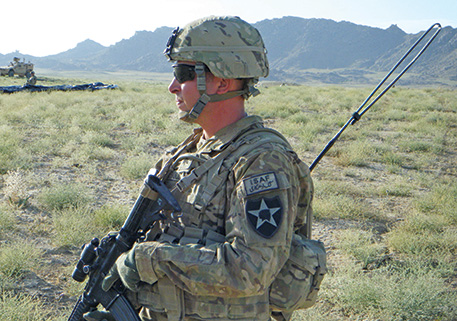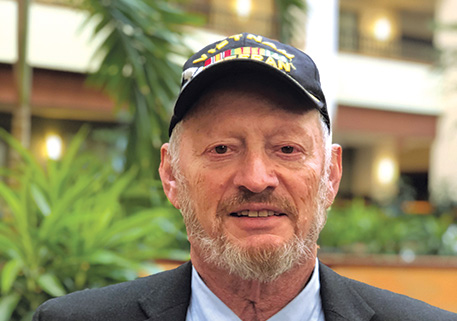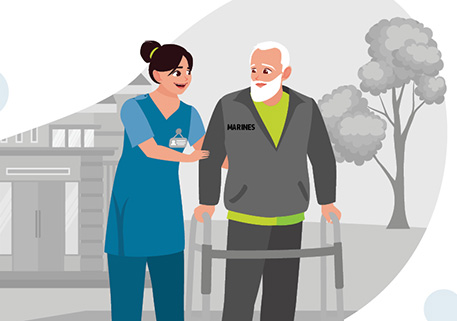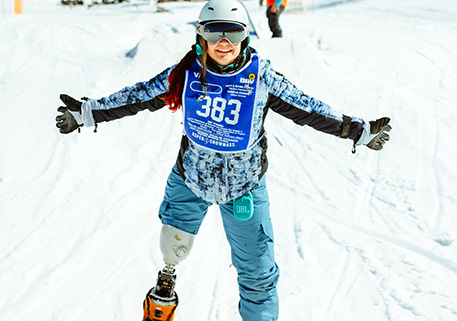How DAV member’s close call reinvigorated his drive to give back
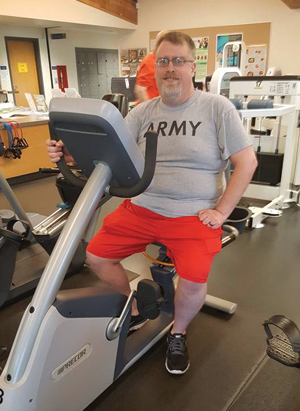
In 2015, Tom Cousino’s wife Heidi Bjurstrom had—as any concerned spouse would—urged him to seek medical attention for inexplicable pain in his knees and ankles.
Cousino, an Army veteran, had been volunteering with the DAV Transportation Network in Portland, Ore., for roughly a year, helping get veterans to and from medical appointments.
“One day while he was volunteering, he looked sick, and it was suggested for him to go to the emergency room,” said Bjurstrom. After thorough testing and evaluation, it was determined that Cousino would need surgery to address an ongoing hip condition.
Though Cousino had experienced some breathing problems in the days leading up to the surgery, he dismissed it as mere anxiety, and the doctors prepped him for surgery.
“It was routine,” said Bjurstrom. “They took him back, and I was expecting about a two- to four-hour wait.”
That’s when everything went black for her husband, and their lives became anything but routine. Cousino had a massive pulmonary embolism, or blood clot, in his heart—what doctors sometimes call a “widow maker.” And as Bjurstrom helplessly stood by, two cardiac teams worked feverishly to keep her husband alive.
Though doctors were able to save his life, Cousino was far from out of the woods.
“All of the doctors were scratching their heads,” he said. “They didn’t know what to do. They had already gotten the chaplain and told my wife I would likely die.”
An MRI revealed Cousino had also suffered a stroke. Furthermore, the medications prescribed to break up the blood clots were not working. Precious minutes ticked by, and doctors decided open-heart surgery was the best solution.
“He was in intensive care for nine days—nobody expected him to live,” said Bjurstrom. “Four separate times, I signed his life away on things they wanted to try.”
Though Cousino’s open-heart procedure went well, his prognosis was unknown, and the expectations for his recovery were modest. He awoke unable to speak or move his right side.
“The doctors weren’t sure if I would be able to walk or talk again,” said Cousino. “It was possible I would end up a vegetable and need taken care of the rest of my life.”
In a change of luck that Cousino credits to the support he received from DAV at every level, things began to slowly improve. He began to feel his right side and even speak. But despite his progress, there were lasting impacts on both Cousino and Bjurstrom.
“I had to quit my job right after getting my master’s degree in order to care for Tom,” said Bjurstrom. “My education was swept under the rug because of his needs. I never saw this coming; it’s just a curveball that life throws you. It changed my understanding of what it meant to be a caregiver and shifted my whole perspective.”
Another pillar of strength for Cousino and his wife was the fact that they knew they could count on DAV.
“We are a big family here at DAV,” said National Membership Director Doug Wells. “When one of our members—or any veteran—is down, we will do all we can to get them back up. A big part of that process is being there for them and listening to what they need.”
“I kept thinking that I can’t let my people down,” Cousino said. “I love DAV. I love helping people. I really believe you can come back from anything—even when the odds are stacked against you. Keep pushing yourself and drive on.”
Though Cousino isn’t yet back to driving for the Transportation Network, he has reinvested himself in a cause that has become near and dear to his heart: He now serves on DAV’s Legislation and Veterans Rights Committee and acts as the Benefits Protection Team leader in his home state.
“I think the health scare just made me more determined to continue to help my fellow veterans,” he said.
Taking his recovery one day at a time, Cousino continues to volunteer his time as he’s able. After his hip surgery—slated for the end of the year—he will put his focus on one issue of critical importance: veteran suicide.
“No veteran should die alone,” said Cousino. “Suicide prevention is my top priority, and I hope that new legislation can bring these numbers down. I’m hoping that we, as veterans, can be there for those who need us.”



